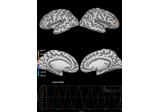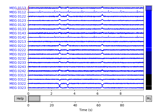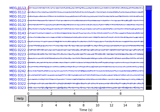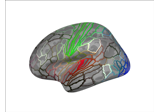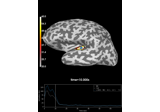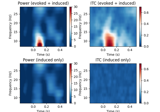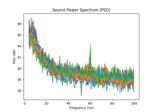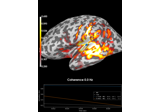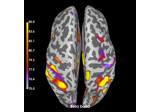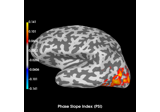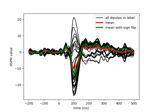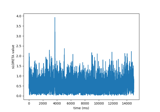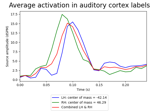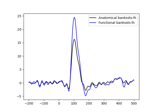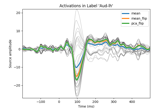mne.Label¶
- class mne.Label(vertices=(), pos=None, values=None, hemi=None, comment='', name=None, filename=None, subject=None, color=None, verbose=None)[source]¶
A FreeSurfer/MNE label with vertices restricted to one hemisphere.
Labels can be combined with the
+operator:Duplicate vertices are removed.
If duplicate vertices have conflicting position values, an error is raised.
Values of duplicate vertices are summed.
- Parameters
- vertices
array, shape (N,) Vertex indices (0 based).
- pos
array, shape (N, 3) |None Locations in meters. If None, then zeros are used.
- values
array, shape (N,) |None Values at the vertices. If None, then ones are used.
- hemi‘lh’ | ‘rh’
Hemisphere to which the label applies.
- comment
str Kept as information but not used by the object itself.
- name
str Kept as information but not used by the object itself.
- filename
str Kept as information but not used by the object itself.
- subject
str|None Name of the subject the label is from.
- color
None| matplotlib color Default label color and alpha (e.g.,
(1., 0., 0., 1.)for red).- verbosebool,
str,int, orNone If not None, override default verbose level (see
mne.verbose()and Logging documentation for more). If used, it should be passed as a keyword-argument only.
- vertices
- Attributes
- color
None|tuple Default label color, represented as RGBA tuple with values between 0 and 1.
- comment
str Comment from the first line of the label file.
- hemi‘lh’ | ‘rh’
Hemisphere.
- name
None|str A name for the label. It is OK to change that attribute manually.
- pos
array, shape (N, 3) Locations in meters.
- subject
str|None Subject name. It is best practice to set this to the proper value on initialization, but it can also be set manually.
- values
array, shape (N,) Values at the vertices.
- verbosebool,
str,int, orNone If not None, override default verbose level (see
mne.verbose()and Logging documentation for more). If used, it should be passed as a keyword-argument only.- vertices
array, shape (N,) Vertex indices (0 based)
- color
Methods
__add__(other)Add Labels.
__hash__(/)Return hash(self).
__len__()Return the number of vertices.
__sub__(other)Subtract Labels.
center_of_mass([subject, restrict_vertices, …])Compute the center of mass of the label.
copy()Copy the label instance.
fill(src[, name])Fill the surface between sources for a source space label.
get_tris(tris[, vertices])Get the source space’s triangles inside the label.
get_vertices_used([vertices])Get the source space’s vertices inside the label.
morph([subject_from, subject_to, smooth, …])Morph the label.
restrict(src[, name])Restrict a label to a source space.
save(filename)Write to disk as FreeSurfer *.label file.
smooth([subject, smooth, grade, …])Smooth the label.
split([parts, subject, subjects_dir, freesurfer])Split the Label into two or more parts.
- center_of_mass(subject=None, restrict_vertices=False, subjects_dir=None, surf='sphere')[source]¶
Compute the center of mass of the label.
This function computes the spatial center of mass on the surface as in 1.
- Parameters
- subject
str|None The subject the label is defined for.
- restrict_verticesbool |
arrayofint| instance ofSourceSpaces If True, returned vertex will be one from the label. Otherwise, it could be any vertex from surf. If an array of int, the returned vertex will come from that array. If instance of SourceSpaces (as of 0.13), the returned vertex will be from the given source space. For most accuruate estimates, do not restrict vertices.
- subjects_dir
str|None The path to the FreeSurfer subjects reconstructions. It corresponds to FreeSurfer environment variable
SUBJECTS_DIR.- surf
str The surface to use for Euclidean distance center of mass finding. The default here is “sphere”, which finds the center of mass on the spherical surface to help avoid potential issues with cortical folding.
- subject
- Returns
- vertex
int Vertex of the spatial center of mass for the inferred hemisphere, with each vertex weighted by its label value.
- vertex
Notes
New in version 0.13.
References
- 1
Eric Larson and Adrian K.C. Lee. The cortical dynamics underlying effective switching of auditory spatial attention. NeuroImage, 64:365–370, 2013. doi:10.1016/j.neuroimage.2012.09.006.
- fill(src, name=None)[source]¶
Fill the surface between sources for a source space label.
- Parameters
- src
SourceSpaces Source space in which the label was defined. If a source space is provided, the label is expanded to fill in surface vertices that lie between the vertices included in the source space. For the added vertices,
posis filled in with positions from the source space, andvaluesis filled in from the closest source space vertex.- name
None|str Name for the new Label (default is self.name).
- src
- Returns
- label
Label The label covering the same vertices in source space but also including intermediate surface vertices.
- label
See also
- get_tris(tris, vertices=None)[source]¶
Get the source space’s triangles inside the label.
- Parameters
- Returns
- morph(subject_from=None, subject_to=None, smooth=5, grade=None, subjects_dir=None, n_jobs=1, verbose=None)[source]¶
Morph the label.
Useful for transforming a label from one subject to another.
- Parameters
- subject_from
str|None The name of the subject of the current label. If None, the initial subject will be taken from self.subject.
- subject_to
str The name of the subject to morph the label to. This will be put in label.subject of the output label file.
- smooth
int Number of iterations for the smoothing of the surface data. Cannot be None here since not all vertices are used.
- grade
int,listof shape (2,),array, orNone Resolution of the icosahedral mesh (typically 5). If None, all vertices will be used (potentially filling the surface). If a list, values will be morphed to the set of vertices specified in grade[0] and grade[1], assuming that these are vertices for the left and right hemispheres. Note that specifying the vertices (e.g.,
grade=[np.arange(10242), np.arange(10242)]for fsaverage on a standard grade 5 source space) can be substantially faster than computing vertex locations. If one array is used, it is assumed that all vertices belong to the hemisphere of the label. To create a label filling the surface, use None.- subjects_dir
str|None The path to the FreeSurfer subjects reconstructions. It corresponds to FreeSurfer environment variable
SUBJECTS_DIR.- n_jobs
int The number of jobs to run in parallel (default 1). Requires the joblib package.
- verbosebool,
str,int, orNone If not None, override default verbose level (see
mne.verbose()and Logging documentation for more). If used, it should be passed as a keyword-argument only. Defaults to self.verbose.
- subject_from
- Returns
- labelinstance of
Label The morphed label.
- labelinstance of
See also
mne.morph_labelsMorph a set of labels.
Notes
This function will set label.pos to be all zeros. If the positions on the new surface are required, consider using
mne.read_surfacewithlabel.vertices.
- restrict(src, name=None)[source]¶
Restrict a label to a source space.
- Parameters
- srcinstance of
SourceSpaces The source spaces to use to restrict the label.
- name
None|str Name for the new Label (default is self.name).
- srcinstance of
- Returns
- labelinstance of
Label The Label restricted to the set of source space vertices.
- labelinstance of
See also
Notes
New in version 0.20.
- save(filename)[source]¶
Write to disk as FreeSurfer *.label file.
- Parameters
- filename
str Path to label file to produce.
- filename
Notes
Note that due to file specification limitations, the Label’s subject and color attributes are not saved to disk.
- smooth(subject=None, smooth=2, grade=None, subjects_dir=None, n_jobs=1, verbose=None)[source]¶
Smooth the label.
Useful for filling in labels made in a decimated source space for display.
- Parameters
- subject
str|None The name of the subject used. If None, the value will be taken from self.subject.
- smooth
int Number of iterations for the smoothing of the surface data. Cannot be None here since not all vertices are used. For a grade of 5 (e.g., fsaverage), a smoothing of 2 will fill a label.
- grade
int,listof shape (2,),array, orNone Resolution of the icosahedral mesh (typically 5). If None, all vertices will be used (potentially filling the surface). If a list, values will be morphed to the set of vertices specified in grade[0] and grade[1], assuming that these are vertices for the left and right hemispheres. Note that specifying the vertices (e.g., grade=[np.arange(10242), np.arange(10242)] for fsaverage on a standard grade 5 source space) can be substantially faster than computing vertex locations. If one array is used, it is assumed that all vertices belong to the hemisphere of the label. To create a label filling the surface, use None.
- subjects_dir
str|None The path to the FreeSurfer subjects reconstructions. It corresponds to FreeSurfer environment variable
SUBJECTS_DIR.- n_jobs
int The number of jobs to run in parallel (default 1). Requires the joblib package.
- verbosebool,
str,int, orNone If not None, override default verbose level (see
mne.verbose()and Logging documentation for more). If used, it should be passed as a keyword-argument only. Defaults to self.verbose.
- subject
- Returns
- labelinstance of
Label The smoothed label.
- labelinstance of
Notes
This function will set label.pos to be all zeros. If the positions on the new surface are required, consider using mne.read_surface with
label.vertices.
- split(parts=2, subject=None, subjects_dir=None, freesurfer=False)[source]¶
Split the Label into two or more parts.
- Parameters
- parts
int>= 2 |tupleofstr|str Number of labels to create (default is 2), or tuple of strings specifying label names for new labels (from posterior to anterior), or ‘contiguous’ to split the label into connected components. If a number or ‘contiguous’ is specified, names of the new labels will be the input label’s name with div1, div2 etc. appended.
- subject
None|str Subject which this label belongs to (needed to locate surface file; should only be specified if it is not specified in the label).
- subjects_dir
str|None The path to the FreeSurfer subjects reconstructions. It corresponds to FreeSurfer environment variable
SUBJECTS_DIR.- freesurferbool
By default (
False)split_labeluses an algorithm that is slightly optimized for performance and numerical precision. SetfreesurfertoTruein order to replicate label splits from FreeSurfer’smris_divide_parcellation.
- parts
- Returns
Notes
If using ‘contiguous’ split, you must ensure that the label being split uses the same triangular resolution as the surface mesh files in
subjects_dirAlso, some small fringe labels may be returned that are close (but not connected) to the large components.The spatial split finds the label’s principal eigen-axis on the spherical surface, projects all label vertex coordinates onto this axis, and divides them at regular spatial intervals.
